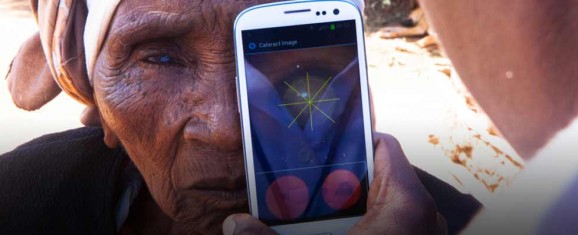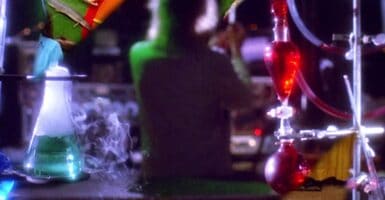Eye-Phone Could Help Prevent Blindness
This article is more than 2 years old
 I’m not a fan of smartphones—I’ll just say that upfront. I admit they’re useful, and my friends’ phones have come in handy more than a few times, but they’re not for me. I don’t want to check email on the toilet and I don’t want my brain to atrophy from lack of use. They simply do too much, and if I had one, I’d be content to let it. But I have to admit, sometimes I hear about what they can do and I almost reconsider my boycott. This is one of those times.
I’m not a fan of smartphones—I’ll just say that upfront. I admit they’re useful, and my friends’ phones have come in handy more than a few times, but they’re not for me. I don’t want to check email on the toilet and I don’t want my brain to atrophy from lack of use. They simply do too much, and if I had one, I’d be content to let it. But I have to admit, sometimes I hear about what they can do and I almost reconsider my boycott. This is one of those times.
Scientists at the London School of Hygiene and Tropical Medicine, the University of St Andrews, and NHS Greater Glasgow and Clyde have created an app that turns a smartphone into a verysmartphone that performs vision tests and helps diagnose eye problems. The portable eye examination kit (PEEK) is currently being tested on 5,000 people in Kenya, in the hope that is can be used to prevent blindness in countries with low incomes and that lack health care.
First, the scientists started with the problem, summed up by a few pertinent statistics: Over 285 million people in the world are visually impaired, and almost 14% of those are blind. 90% of these people live in low-income countries, and approximately 80% of blindness is easily preventable. It makes perfect sense, then, to work on a system to target the individuals most at-risk, and get avoid blindness before it begins.
Part of the reason these numbers are so high is because people who need help the most often have no access to preventative care. “Patients who need it most will never be able to reach hospital because they’re the ones beyond the end of the road, they don’t have income to find transport so we needed a way to find them,” says Dr. Andrew Bastawrous, one of PEEK’s developers. The cost of going to patients is prohibitive—performing ophthalmic tests requires a trained team of over a dozen people, as well as pricey hospital equipment, not to mention the cost of moving all of the people and machines. There hasn’t been a simple, low-cost solution for the problem of blindness—until now.
 Using a mobile app and attachable hardware, the PEEK system turns a regular smartphone into one that can detect cataracts, glaucoma, macular degeneration, as well as verify prescriptions for glasses. The system even identifies warning signs of brain tumors or hemorrhages by scanning for nerve and retinal diseases. PEEK is easy to use—it requires minimal training and can get detailed information for immediate and future use—and, of course, it’s extremely portable. “What we can do using this is the technicians can go to the patients to their homes, examine them at their front doors and diagnose them there and then,” says Dr. Bastawrous.
Using a mobile app and attachable hardware, the PEEK system turns a regular smartphone into one that can detect cataracts, glaucoma, macular degeneration, as well as verify prescriptions for glasses. The system even identifies warning signs of brain tumors or hemorrhages by scanning for nerve and retinal diseases. PEEK is easy to use—it requires minimal training and can get detailed information for immediate and future use—and, of course, it’s extremely portable. “What we can do using this is the technicians can go to the patients to their homes, examine them at their front doors and diagnose them there and then,” says Dr. Bastawrous.
PEEK is also being used on the eyes of explorers in Antarctica to measure the effects of living in such a cold, dark environment. The data gathered will also useful to NASA and other organizations sending people into space. Maybe no one can hear you scream, but out there, you damn well be able to see. The International Agency for the Prevention of Blindness calls the tool “potentially a huge game changer.” We’ll just have to wait and (groan) see.












